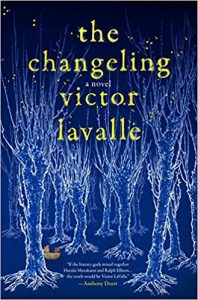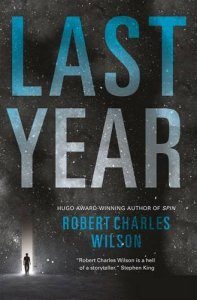Gary K. Wolfe Reviews The Changeling by Victor LaValle
The Changeling, Victor LaValle (Spiegel & Grau 978-0-8129-9594-7, $28.00, 434pp, hc) June 2017.
 At least since his Shirley Jackson Award-winning The Big Machine back in 2009, and probably before that, Victor LaValle has been edging toward more direct engagement with genre materials, although his trademark approach has been to frame such materials in his sharp-edged brand of social realism. Last year, The Ballad of Black Tom (also nominated for multiple awards) was among the most discussed contributions to the ongoing Lovecraft rebuild, or revision, or subversion, or whatever it was, and this year he’s even taken on Frankenstein with his comic book series Destroyer. The Changeling, as the title suggests, harks back to an even older tradition of fantastika, and may be his most fully realized novel so far. The social realism aspect dominates the first half, with a few carefully modulated signs of creeping weirdness, until the tone rather abruptly shifts into a conspiratorial thriller and finally, depending on your reading protocols, the novel either flies off the rails entirely, or comes home to Papa. Along the way, LaValle invokes not only the fairytale changeling theme and other folklore traditions, but the classically unsettling Maurice Sendak children’s book Outside Over There and even, for good measure, To Kill a Mockingbird. It becomes clear that LaValle knows his horror traditions well beyond Lovecraft, and he knows about as well as anyone how to evoke mysteriously preternatural settings within the context of a kind of documentary urban realism. I may be part of a pretty narrow target audience here, but for anyone who’s been haunted by those widely reproduced photos of the overgrown abandoned hospitals on North Brother Island in New York’s East River, this is the novel we’ve been waiting for. (But maybe that shouldn’t be explained just yet.)
At least since his Shirley Jackson Award-winning The Big Machine back in 2009, and probably before that, Victor LaValle has been edging toward more direct engagement with genre materials, although his trademark approach has been to frame such materials in his sharp-edged brand of social realism. Last year, The Ballad of Black Tom (also nominated for multiple awards) was among the most discussed contributions to the ongoing Lovecraft rebuild, or revision, or subversion, or whatever it was, and this year he’s even taken on Frankenstein with his comic book series Destroyer. The Changeling, as the title suggests, harks back to an even older tradition of fantastika, and may be his most fully realized novel so far. The social realism aspect dominates the first half, with a few carefully modulated signs of creeping weirdness, until the tone rather abruptly shifts into a conspiratorial thriller and finally, depending on your reading protocols, the novel either flies off the rails entirely, or comes home to Papa. Along the way, LaValle invokes not only the fairytale changeling theme and other folklore traditions, but the classically unsettling Maurice Sendak children’s book Outside Over There and even, for good measure, To Kill a Mockingbird. It becomes clear that LaValle knows his horror traditions well beyond Lovecraft, and he knows about as well as anyone how to evoke mysteriously preternatural settings within the context of a kind of documentary urban realism. I may be part of a pretty narrow target audience here, but for anyone who’s been haunted by those widely reproduced photos of the overgrown abandoned hospitals on North Brother Island in New York’s East River, this is the novel we’ve been waiting for. (But maybe that shouldn’t be explained just yet.)
The Changeling begins by calling itself a “fairy tale,” but it takes a while for this to amount to more than a few coy references (the protagonist’s favorite high school teacher, for example, is Mr. Perrault). Apollo Kagwa is only four when his American father disappears, leaving behind a box labeled Improbabilia, which includes the aforementioned Sendak book, leading Apollo to a fascination with books that leads to a career as a bookseller. Raised by his Ugandan immigrant mother, Apollo (named for the character from the Rocky movies, though he repeatedly tells himself he’s the god Apollo) dreams of his father reappearing to take him away. This sets up what turns out to be the central family dynamic of the tale, which is reflected in Apollo’s own marriage to Emma Valentine, a librarian, and the birth of their son Brian. Emma’s post-partum behavior gets pretty odd, as she claims to receive on her phone disturbing photos of the baby (which promptly disappear), joins a rather cryptic message board, receives guidance from someone called Cal, and inexplicably buys a bag full of chains from a stranger somehow connected to Cal. We soon find out what the chains are for, and Emma’s horrific pivotal action, just before disappearing herself, makes it clear we’ve shifted into full dark fantasy mode. (LaValle unnecessarily but entertainingly underlines this shift by titling the first three sections of the novel after the children’s rhyme “first comes love, then comes marriage,” then titling the fourth section “shit, damn, motherfucker”).
At one point, the gender and family politics of the novel seem to be heading into hazardous territory, as Apollo’s desperate and vengeful search for his apparently mad wife leads him to commit a crime of his own, resulting in a brief sentence on Riker’s Island. He finds an ally in an oddball named Wheeler, who had paid a ridiculous amount for a first edition of the Harper Lee novel in a futile effort to shore up his own failing relationship, and the two find themselves confronting what appears to be a coven of “wise women,” or witches. The old and too-easy trope of victimized males dealing with a secret society of powerful women turns out to be another narrative blind – there’s a pretty scary group of men here, too – and what we eventually learn about Emma and about Apollo’s own father shifts the tone again, as LaValle hauls out a monster from yet another corner of folklore. The chapters get shorter and more cliffhangery, and while some readers may experience the transition into fantasy thriller mode as a kind of narrative whiplash, in fact LaValle modulates the shifts in rhythm and tone with the mastery of a great tenor sax player, and in the end The Changeling is very much of a piece, with nearly all the later twists prefigured by earlier clues, and the abiding themes of parenthood and loss examined with heartfelt insights and uncompromising detail. It’s a model of what post-genre fiction can do when it respects all its sources, and is little frightened of some of them.
Gary K. Wolfe is Emeritus Professor of Humanities at Roosevelt University and a reviewer for Locus magazine since 1991. His reviews have been collected in Soundings (BSFA Award 2006; Hugo nominee), Bearings (Hugo nominee 2011), and Sightings (2011), and his Evaporating Genres: Essays on Fantastic Literature (Wesleyan) received the Locus Award in 2012. Earlier books include The Known and the Unknown: The Iconography of Science Fiction (Eaton Award, 1981), Harlan Ellison: The Edge of Forever (with Ellen Weil, 2002), and David Lindsay (1982). For the Library of America, he edited American Science Fiction: Nine Classic Novels of the 1950s in 2012, with a similar set for the 1960s forthcoming. He has received the Pilgrim Award from the Science Fiction Research Association, the Distinguished Scholarship Award from the International Association for the Fantastic in the Arts, and a Special World Fantasy Award for criticism. His 24-lecture series How Great Science Fiction Works appeared from The Great Courses in 2016. He has received six Hugo nominations, two for his reviews collections and four for The Coode Street Podcast, which he has co-hosted with Jonathan Strahan for more than 300 episodes. He lives in Chicago.
This review and more like it in the November 2017 issue of Locus.







